1 citations,
January 2012 in “Médecine et Maladies Infectieuses” The man's symptoms improved significantly after penicillin treatment for syphilis.
[object Object] 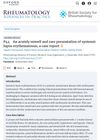 November 2024 in “Rheumatology Advances in Practice”
November 2024 in “Rheumatology Advances in Practice” Early recognition and treatment of SLE can improve outcomes in patients with complex symptoms.
 September 2024 in “International Journal of Innovative Science and Research Technology (IJISRT)”
September 2024 in “International Journal of Innovative Science and Research Technology (IJISRT)” Early diagnosis and aggressive treatment of lupus nephritis can prevent kidney damage and improve outcomes.
 September 2024 in “Journal of the American Academy of Dermatology”
September 2024 in “Journal of the American Academy of Dermatology” Botulinum toxin is not effective for treating male hair loss.
 August 2024 in “Intisari Sains Medis”
August 2024 in “Intisari Sains Medis” A 17-year-old girl with lupus had vocal cord paralysis but improved with treatment.
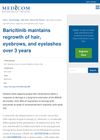
Baricitinib helps keep hair, eyebrows, and eyelashes regrown for 3 years in most people with severe hair loss.
 April 2024 in “Frontiers in pharmacology”
April 2024 in “Frontiers in pharmacology” Brepocitinib 30mg is most effective for moderate-to-severe alopecia areata, but ritlecitinib 50mg may offer a better balance of safety and effectiveness.
March 2024 in “Molecules/Molecules online/Molecules annual” Enzymatically extracted bear oil has more unsaturated fats and significantly increases hair growth in mice.
 December 2023 in “American journal of medical genetics. Part A”
December 2023 in “American journal of medical genetics. Part A” A new syndrome was linked to two new genetic changes in the MBTPS1 gene in a 14-year-old girl.
 August 2023 in “Authorea (Authorea)”
August 2023 in “Authorea (Authorea)” Tinea capitis should be considered in adults with scalp issues for proper treatment.
 August 2023 in “The American Journal of Medicine”
August 2023 in “The American Journal of Medicine” A young woman with lupus was treated with hydroxychloroquine and prednisone.
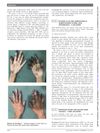
Psychosis can be an early sign of neuropsychiatric lupus, treatable with tailored medication.
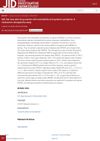 April 2023 in “Journal of Investigative Dermatology”
April 2023 in “Journal of Investigative Dermatology” Some patients who had a severe drug reaction developed long-term hair loss.
 January 2023 in “International Journal of Contemporary Pediatrics”
January 2023 in “International Journal of Contemporary Pediatrics” A rare genetic disease causes rickets and often hair loss in young children, which can improve with specific treatments.
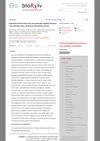 December 2022 in “bioRxiv (Cold Spring Harbor Laboratory)”
December 2022 in “bioRxiv (Cold Spring Harbor Laboratory)” The new vaccine platform led to a stronger immune response and better protection against the flu than the traditional vaccine.
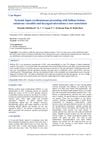 October 2022 in “International journal of research in dermatology”
October 2022 in “International journal of research in dermatology” A woman with lupus had unusual symptoms like blisters, skin inflammation, and throat ulcers, which improved with steroid and dapsone treatment.
[object Object]  September 2022 in “Annals of medicine and surgery”
September 2022 in “Annals of medicine and surgery” Three siblings with a rare genetic condition had abnormal sexual development and chose different gender identities, needing surgery and therapy.
 May 2022 in “Journal of the American Academy of Dermatology”
May 2022 in “Journal of the American Academy of Dermatology” The document suggests using a topical Vitamin D treatment for hair loss rather than oral supplements and calls for more research.
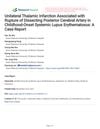 November 2021 in “Research Square (Research Square)”
November 2021 in “Research Square (Research Square)” A 16-year-old boy with lupus had a rare brain artery issue but fully recovered with treatment.
The transgenic safflower oil with oleosin-rhFGF9 improved hair growth and wound healing in mice.
June 2017 in “Journal of Clinical and Health Sciences” A woman developed folliculitis after long-term acitretin treatment for pustular psoriasis.
A woman developed folliculitis after taking acitretin for psoriasis, which was treated with skin dressing and antibiotics.
 April 2016 in “Journal of Investigative Dermatology”
April 2016 in “Journal of Investigative Dermatology” Vitamin D can reduce skin inflammation caused by UV rays by enhancing cell "fitness" and skin repair.
 October 2015 in “Elsevier eBooks”
October 2015 in “Elsevier eBooks” Aldesleukin can treat certain cancers and increase HIV patient CD4+ counts but often causes severe side effects.
 April 2011 in “The FASEB Journal”
April 2011 in “The FASEB Journal” Aralia continentalis root extract may help with hair growth.
 April 2010 in “The FASEB Journal”
April 2010 in “The FASEB Journal” Korean ginseng berry may help with hair regrowth.
 April 2007 in “Nature Clinical Practice Urology”
April 2007 in “Nature Clinical Practice Urology” TICE salvage chemotherapy is effective for treating germ-cell tumors with poor prognosis.
November 2005 in “Physiology” Apoptosis, not oxidative stress, is linked to aging in mice with mtDNA mutations.
January 1987 in “Toxicological sciences” SMR-2 and SMR-6 are much more toxic than retinoic acid, causing severe symptoms and organ damage in mice.
 January 2012 in “The Year book of dermatology”
January 2012 in “The Year book of dermatology” Finasteride 5mg/day improves hair loss in normoandrogenic Asian women.






















